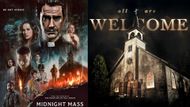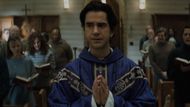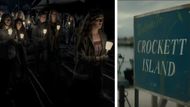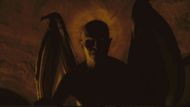When Mike Flanagan's Midnight Mass saw a Netflix release in 2021, it was instantly clear from the get-go that this wasn't just another horror Flannaverse series. Yes, there is a literal 'monster', there is blood, and the creeping dread that Flanagan has always been famous for.
But Midnight Mass stands apart from most of the horror shows because the true exploration of horror and dread isn't rooted in creepy ghosts/creatures or darkness hiding in the shadows - but rather, it's in the form of scripture, sermons, and the desperation of people wanting to cling to faith.
Religion is anything but a background arc in this story. It is the driving force, and the lens through which each choice in every episode is filtered, and that is why this installment in the Flannaverse is less about horror in the traditional sense and more about what happens when religious belief turns into madness and obsession.
Faith as a comfort and a weapon in Flanagan's Midnight Mass on Netflix
From the first episode, Midnight Mass takes us to Crockett Island, which is a place where religion is the community's glue. With little to no opportunity on the island, extremely few resources, and a small population that is tied together by routine, church isn't just worship, but it's the identity of the people living in Crockett.

Things start to get shaky when a young priest, Father Paul, breathes new life into this dull and weary town, sparking a new and renewed devotion. But the brilliance of Midnight Mass is in how it shows faith's duality. For some, religion offers comfort and community; for others, it slowly starts to turn into a weapon of control.
When Father Paul delivers his first few sermons at church, they sound comforting. He tells his people;
"God loves you just the way you are. You are enough.”
These are simple words being said by a priest, and yet they are powerful enough to breathe life into a town that has been slowly dying for years. It’s no wonder the people on Crockett trust him so quickly.
His words echo truths recognizable to anyone raised with beliefs of scripture-hope, redemption, and eternal life. Yet under his guidance, those promises shift from spiritual metaphors into dangerous absolutes, and soon after, Father Paul's charisma turns sermons into hypnotic acts.
The miracles that he starts to perform feel anything but holy. They’re unsettling. A frail old woman suddenly looks younger overnight. A person who's been paralyzed for years stands and walks in front of the church. Dead animals start coming up to the shores of the island, with their bodies being drained of blood. These aren’t blessings, but warnings.
However, not everyone sees the signs, and this is how Midnight Mass captures what happens when faith goes unchecked. It shows how reverent faith without a grasp on reality can transform from comfort into justification for harm. It's not a critique of belief itself, but of how belief is falsely used, twisted, and wielded when desperation makes people vulnerable.
Riley’s crisis of belief
At the heart of Midnight Mass is Riley Flynn, the island's prodigal son, who returns to Crocket after years of being held in prison for the murder of a young woman in a driving accident.

Riley, here, represents the lapsed believer, i.e., the person who has seen enough of the world's cruelty to doubt the neat answers religion provides. His conversations with Erin are some of the show's most touching moments, unpacking what happens when someone questions the framework they were raised in.
For Riley, the church doesn't offer redemption but only guilt. His skepticism soon starts to become a rebellion against Father Paul's growing influence on him. In Midnight Mass, Riley represents those who walk away from religion but still have inner fights with existential questions: What happens when we die? Is there meaning beyond suffering?
His ultimate fate of offering himself to protect others becomes its own kind of sacrament. It's a powerful statement on how morality doesn't always require scripture, and how sacrifice can exist outside the language of faith.
Bev Keane: The face of religious extremism
Every story about belief needs its zealot, and in Midnight Mass, Bev Keane fills that role. Bev isn't a villain because she misreads scripture, but rather, she's terrifying because she believes she's the only one who is reading it correctly. Her self-righteousness makes her untouchable, even as she makes way for horrors being brought by Father Paul under the guise of God's will and religion.

What makes Bev so compelling and frustrating is that she isn't a supernatural creature. She's human, and her kind of zeal does exist in the real world. Midnight Mass uses her to explore the most dangerous aspect of religion: When belief becomes flawless and compassion disappears. By the finale, Bev's faith doesn't bring her peace; it only further fuels her cruelty, and her ending is exactly what it should be.
While others accept death at sunrise, Bev flinches and tries to dig herself into the sand to escape the light. It’s such a telling detail of how she never faced her sins, never forgave or sought forgiveness, so when the end came, she couldn’t find peace.
Father Paul and the seduction of miracles at Mass
If Riley is the skeptic and Bev the extremist, Father Paul represents the middle ground: The well-intentioned believer who has himself been seduced by miracles. His arc in Midnight Mass is deeply tragic. He doesn't set out to destroy Crockett Island; he only wants to save it but this is where things go south.

If you’ve watched Midnight Mass, then you know everything on Crockett Island starts with Father Paul. He shows up as this kind, thoughtful priest, but eventually we learn he’s actually Monsignor Pruitt, the island’s longtime pastor, made young again after a terrifying encounter in Jerusalem.
Lost in a desert storm, he stumbled into a cave where a winged creature gave him blood to drink. Convinced it was an angel, he returned home to Crocket with the creature and began secretly feeding its blood to the congregation during communion.
At first, the “miracles” are breathtaking, where we see Leeza walking again, Mildred gets younger, and the people feel stronger. But as Dr. Sarah Gunning notices, the blood has horrifying side effects. It burns in sunlight and pushes people toward full transformation once they’ve consumed too much.
The winged "angel" here is framed as divine intervention, and the town eagerly embraces the healing and renewed vitality it brings. But the show deliberately blurs the line between miracle and monstrosity.
Father Paul's downfall isn't that he's evil but that he's human. He wants to believe in a higher purpose for the creature he unleashes. He wants his flock to feel chosen, special, redeemed. Father Paul himself quoted John 6:51 during Mass:
“Whoever eats my flesh and drinks my blood has eternal life.”
For him, this “angel” was biblical proof. However, the horror lies in his inability to admit that not every wonder comes from God.
The Island as a metaphor for isolation and control
Just like all previous works of Mike Flanagan, Crockett Island isn't just a setting, but it's a character within itself. The isolation on the island allows the show to feel both claustrophobic and symbolic. On the mainland, there might be escape or doubt but here? Everyone is cut off from the world, and religion becomes not just dominant but absolute.

Mike Flanagan also mirrors real communities where religion starts to fill up every space, whether it be schools, politics, family, or even societal hierarchy. In Midnight Mass, the island is a magnifying glass showing how faith can unify a people while also suffocating individuality, and with this, Flanagan reminds us that isolation, whether physical or ideological, creates a well-soiled and watered ground for religious extremism to grow unchecked.
Death, resurrection, and the final reckoning
No exploration of Midnight Mass is complete without its reflection on death. Flanagan doesn't look or take away from the biggest question faith tries to answer: What comes after? Erin's monologue about returning to the cosmos and Riley's visions of nothingness clash directly with Father Paul's promise of eternal life.
The show doesn't offer a single answer but it shows the terrifying beauty of belief and doubt coexisting.

The finale of Midnight Mass strips religion down to its bones. Faced with an apocalypse, characters can no longer hide behind sermons or scripture. They must decide whether faith is about clinging to life at any cost or accepting mortality with dignity.
As the sun rises, the entire island is consumed. Those who took the creature’s blood burn alive. Father Paul finally accepts the truth of his sins and dies in the arms of Mildred. Leeza and Warren, the only survivors, row out to sea, watching as everything they knew disappears in flames.
The creature, wings torn apart, tries to fly to safety. We never see if it makes it. But the point isn’t whether it lives or dies. The point is belief. To some, it was an angel. To others, it was a monster. What mattered was how each person responded to it.
By dawn, the hymns are gone, the church is burnt down, and the survivors aren't the most devout but the most human. That ending emphasizes the show's most thought-provoking idea: Religion isn't salvation, but compassion is.
Part of why Midnight Mass is sure to stay with you long after the credits roll is because it doesn't mock religion, but interrogates it. It acknowledges faith, how beautiful it can be, the comfort it provides, and the sense of belonging it creates. But it also exposes the dangers when wrongly believed: Blind devotion, manipulation, and the ease with which hope can be weaponized.
Midnight Mass feels both familiar and unsettling. Its sermons sound real. Crocket Island feels lived in. But the horror is effective because it's grounded in truth: Faith can inspire humanity's best and excuse its worst. That's why the show remains one of Flanagan's most personal and profound works.
Midnight Mass isn't just a Netflix horror series; it's a meditation on faith, mortality, and the dangerous beauty of belief. By centering religion as both salvation and damnation, Mike Flanagan creates a story that is as spiritual as it is terrifying.
Stay tuned to SoapCentral for more.
Also read: Who plays Cipher in Gen V Season 2? Actor’s career and notable projects explored
